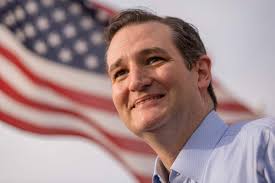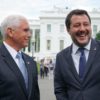di Alia K. Nardini
 Procede negli Stati Uniti la sfida per la nomination. Hillary Clinton vince le primarie Democratiche in Arizona con il 57,6% e più 17 punti percentuali di vantaggio su Bernie Sanders; il Senatore del Vermont conquista invece l’Idaho (78%, contro solo il 21,2% di Hillary) e lo Utah (79,3% contro il 20,3% di Clinton). Si tratta di risultati largamente previsti, seppur importanti, che mantengono Sanders competitivo. Ciò nonostante, i 17+26 delegati (43 in totale) che si aggiudica il Senatore del Vermont poco possono contro i 44 che Clinton guadagna in Arizona. Questi vanno ad aggiungersi ai guadagni proporzionali di Hillary in Utah (+6) e in Idaho (+5). Ora l’ex Segretario di Stato prosegue inesorabile la sua marcia verso la nomination. Clinton ha difatti 1690 delegati in totale, contro i 946 di Sanders.
Procede negli Stati Uniti la sfida per la nomination. Hillary Clinton vince le primarie Democratiche in Arizona con il 57,6% e più 17 punti percentuali di vantaggio su Bernie Sanders; il Senatore del Vermont conquista invece l’Idaho (78%, contro solo il 21,2% di Hillary) e lo Utah (79,3% contro il 20,3% di Clinton). Si tratta di risultati largamente previsti, seppur importanti, che mantengono Sanders competitivo. Ciò nonostante, i 17+26 delegati (43 in totale) che si aggiudica il Senatore del Vermont poco possono contro i 44 che Clinton guadagna in Arizona. Questi vanno ad aggiungersi ai guadagni proporzionali di Hillary in Utah (+6) e in Idaho (+5). Ora l’ex Segretario di Stato prosegue inesorabile la sua marcia verso la nomination. Clinton ha difatti 1690 delegati in totale, contro i 946 di Sanders.
Sanders è tuttavia innegabilmente in una fase ascendente e positiva, mentre guarda con ottimismo al voto di sabato in cui il partito Democratico sarà impegnato nei caucus di Alaska, Hawaii e nello stato di Washington. Il problema di Sanders non è certamente la capacità di vincere: è oramai chiaro che il Senatore del Vermont può rivelarsi competitivo. Tuttavia, Sanders raramente riporta vittorie di ampio margine, e anche quando questo accade (come appunto in Idaho e Utah), non si tratta mai di stati abbastanza importanti da conferirgli un abbondante numero di delegati. La strategia di Sanders è stata finora di potenziare la propria raccolta fondi all’indomani di ogni successo, per reinvestire nella propria campagna sperando in successi incrementali. Il partito tuttavia inizia a fare pressioni sul Senatore del Vermont, affinché si ritiri e lasci campo libero a Hillary Clinton per concentrarsi sulla sfida a livello nazionale contro i Repubblicani. Tuttavia, è proprio il confronto con Sanders che sta dando a Hillary un ambito privilegiato in cui far risuonare il proprio messaggio alla nazione, senza attaccare troppo direttamente Trump e Cruz e rischiare di alienare ancor più l’elettorato populista e anti-establishment.
Nel partito Repubblicano, Trump vince le primarie dell’Arizona con il 47,1% delle preferenze, aggiudicandosi tutti i 58 delegati in palio. Cruz segue con il 24,9%, mentre Kasich ottiene il 10%. In Utah, Ted Cruz non solo vince come previsto, ma stravince con il 69,2% dei voti, staccando nettamente Kasich, secondo al 16,8%, e Trump – fermo al 14%. Avendo superato la soglia del 50%, il Senatore del Texas si aggiudica tutti i 40 delegati in palio, contando sul largo appoggio della comunità mormone. Il conteggio totale dei delegati vede Trump ancora al comando con 738 delegati; seguono Cruz, con 463, e Kasich, a 143.
Inizia intanto a farsi sentire l’eco degli attentati terroristici di Bruxelles, mentre la campagna di Donald Trump assume toni sempre più estremi. Trump, che già a gennaio aveva definito il Belgio “un inferno” per il gran numero di mussulmani a sua detta non assimilati e radicalizzati nel tessuto sociale, si trova ora nella paradossale posizione di aver predetto la disgrazia. L’imprenditore newyorchese chiede a gran voce di legittimare la tortura, incluso il waterboarding, promettendo di ricorrere da Presidente ad ogni mezzo per interrogare i sospetti. Rilancia Ted Cruz, che pretende ronde di sorveglianza nei quartieri a maggioranza mussulmana, facendo suoi i risultati di un recente sondaggio ABC news in cui il 60% del GOP si è dichiarato a favore di un blocco totale all’immigrazione mussulmana (in stati come Alabama, si è raggiunto quasi l’80%). A dicembre, la percentuale era al di sotto del 40%.
A livello nazionale, la strada potrebbe ora rivelarsi inaspettatamente in salita per Hillary Clinton. L’ex Segretario di Stato vorrebbe apparire ferma e risoluta, di fronte all’agitazione propagata da Trump. Vorrebbe rassicurare gli americani riguardo alla propria esperienza e competenza in politica estera, in una delicata fase in cui non si è lasciata ancora definitivamente alle spalle Benghazi. Clinton non può nemmeno contraddire la corrente linea della Casa Bianca, che chiede moderazione e unitarietà. Mentre il Washington Times titola “imparando a pronunciare ‘Presidente Trump’”, e con il terrorismo asimmetricamente presentato dai media statunitensi come qualcosa che riguarda unicamente l’Occidente, in contrapposizione con l’Islam, all’ex Segretario di Stato potrebbe non bastare ricordare che cadere nella trappola della guerra di religione è ciò che l’ISIS primo tra tutti vuole. Gli americani sembrano in preda a paure irrazionali, e con Obama impegnato a Cuba l’unico ad aver agito con forza in Siria contro lo Stato Islamico è Vladimir Putin.
Se pur vero è che i Repubblicani nel complesso beneficeranno del sentimento antimussulmano che si propaga nell’elettorato statunitense, l’America sembra volere prima di tutto un leader forte, che vada oltre alla tradizionale contrapposizione Democratici/Repubblicani. E mentre la venerabile Heritage Foundation chiede di reinvestire nella difesa, e Trump incontra il comitato editoriale del super influente Washington Post, i temi rilevanti di questa campagna sembrano prendere una nuova svolta e concentrarsi su immigrazione e terrorismo. L’America vuole sentirsi al sicuro, allo stesso tempo tornando ad essere influente. Il prossimo presidente potrebbe essere chi meglio saprà rispondere a queste richieste.
* * *
 In the United States, the battle for the nomination continues. Hillary Clinton won the Democratic primary in Arizona with 57.6% of the preference, more than 17 percentage points ahead of Bernie Sanders; however, the Senator from Vermont earned a decisive victory in Idaho (78% of the votes, compared to Hillary’s scanty 21.2%) and Utah (79.3%, versus 20.3% for Clinton). Although results were widely anticipated by the polls, they matter nevertheless, as Sanders remains competitive. Still, his 17 + 26 wins (that’s 43 delegates) do not pose a serious challenge to Clinton’s victory in Arizona, which yields her a similar amount of delegates (44) and add to her proportional gains in Utah (+6) and Idaho (+5). These numbers propel the former Secretary of State forwards in her inexorable march to the nomination. Clinton now has 1,690 delegates in total, compared to Sanders’ 946.
In the United States, the battle for the nomination continues. Hillary Clinton won the Democratic primary in Arizona with 57.6% of the preference, more than 17 percentage points ahead of Bernie Sanders; however, the Senator from Vermont earned a decisive victory in Idaho (78% of the votes, compared to Hillary’s scanty 21.2%) and Utah (79.3%, versus 20.3% for Clinton). Although results were widely anticipated by the polls, they matter nevertheless, as Sanders remains competitive. Still, his 17 + 26 wins (that’s 43 delegates) do not pose a serious challenge to Clinton’s victory in Arizona, which yields her a similar amount of delegates (44) and add to her proportional gains in Utah (+6) and Idaho (+5). These numbers propel the former Secretary of State forwards in her inexorable march to the nomination. Clinton now has 1,690 delegates in total, compared to Sanders’ 946.
Sanders, however, is undeniably accumulating a strong momentum, and he remains optimistic as he sets his sights toward Saturday when the Democratic Party will be engaged in caucuses in Alaska, Hawaii and Washington. Sanders’ problem is certainly not in his ability to win: it is now clear that the Vermont Senator can be, and is, very competitive. However, Sanders has not won big, and even when he has (just as it happened in Idaho and Utah), it is in states that are not important enough to bring a considerable number of delegates to his side. Sanders’ strategy so far has been to capitalize on his fund-raising abilities in the aftermath of success, thus reinvesting in his campaign and hoping for a domino effect to come. However, the party has begun to put pressure on the Vermont Senator to withdraw from the race in order to leave an open field for Hillary Clinton to challenge Republicans nationwide. However, it is in her contention with Sanders that Hillary can find a privileged stage, where her message to the nation may resonate. This will save her from engaging on a one-to-one basis with Trump, possibly alienating grassroots, anti-establishment supporters.
In the Republican Party, Trump won the Arizona primary with 47.1% of the vote and earned all 58 delegates at stake. Cruz followed with 24.9% of the preference, while Kasich stopped at 10%. In Utah, Ted Cruz not only won as expected, but hands down at that, with 69.2% of the votes. Kasich trailed at 16.8%, while Trump came last with 14% of the preference. Having crossed the 50% threshold, the Texas Senator won all 40 delegates at stake, relying on broad support from the Mormon community. The total count of delegates nevertheless sets Trump in the lead with 738 delegates; Cruz follows at 463, while Kasich has 143.
Meanwhile, the echo of the terrorist attacks in Brussels has begun to resonate with the American public, and Donald Trump’s campaign assumes more extreme overtones. The new York Businessman referred to Belgium as “a hellhole” last January, because of its large number of radicalized Muslims who he claimed had not been assimilated into the social fabric. Thus Trump is now in the paradoxical position of having predicted the violence to come. The tycoon is now clamoring to legitimize torture including waterboarding, promising that he would legalize harsher measures to interrogate suspects, were he to become President. Ted Cruz raised the stakes, calling for the need to “patrol and secure Muslim neighborhoods”. A recent ABC news poll confirms that 60% of GOP supporters are now in favor of a total ban on Muslim immigration (in Alabama , the percentage reached almost 80%). Last December, numbers were well below 40%.
As a consequence, on a national level the road might unexpectedly head uphill for Hillary Clinton. The former Secretary of State has the ungrateful task of appearing firm and competent in the face of Trump’s frenzy. She must reassure Americans of her foreign policy credentials, in a delicate phase in which the echoes from Benghazi are far from over. Clinton must also not contradict the current White House line, calling for restraint and unity. While the Washington Times title “learning to say ‘President Trump’”, Clinton asks not to disseminate hatred and fear. In the meantime, terrorism is asymmetrically portrayed by the U.S. media as something that only concerns the West, in an ongoing clash of religions and cultural battle with Islam. It might not be enough for the former Secretary of State to remind America that falling into the trap of a religious war is precisely what ISIS wants. While the U.S. seems to be falling prey to irrational fears, and President Obama seems more concerned with Cuba and defending the Affordable Care Act, the only one who appears to have acted decisively in Syria against the Islamic State is Vladimir Putin.
Surely, the GOP as a whole will benefit from the anti-Muslim rhetoric that is propagating among U.S. electorate. However, America seems to demand a strong leader, beyond the traditional Democratic/Republican divide. While the influential Heritage Foundation asks to increase defense spending, and Trump meets the Washington Post editorial board, the themes of this campaign seem more and more to be turning towards immigration and homeland security. America wants to feel safe, while at the same time demanding to be great again. The next president could be the one who is best perceived to answer these growing demands.
* Trump, l’inevitabile? / Trump, the inevitable?
* Verso la nomination / Racing towards the nominations
* Iowa: prima vittoria per Cruz e Clinton / Iowa: first victory for Cruz and Clinton
* Il New Hampshire e la corsa alla presidenza / New Hampshire and the White House Race







Lascia un commento